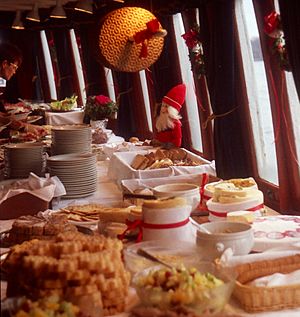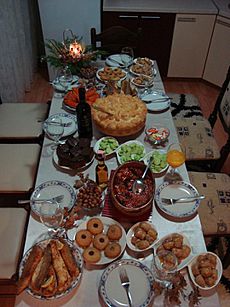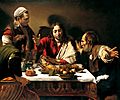List of dining events facts for kids
This article lists many different kinds of dining events from history and today. These events can be big parties like banquets and feasts, or smaller gatherings like dinner parties. Some of these meals are very fancy with many courses and drinks, while others are much simpler. They often bring people together for special reasons, like celebrations, holidays, or important meetings.
Contents
Special Dining Events
- Banquet of Chestnuts – This was a famous party in Rome in 1501, supposedly held by a powerful cardinal named Cesare Borgia. It was also known as the "Ballet of Chestnuts."
- Banquet of the Five Kings – In 1363, the kings of England, Scotland, France, Denmark, and Cyprus all met for a special meal.
- Booker T. Washington dinner at the White House – In 1901, President Theodore Roosevelt invited his advisor, Booker T. Washington, who was an African American leader, to eat dinner with his family at the White House. This caused a lot of discussion and upset among some people at the time. Because of this, no other African American was invited to dinner at the White House for nearly 30 years.
- Feast at Swan Goose Gate – This feast happened in 206 BC. It was a meal held by rebels who were fighting against the Qin Dynasty in ancient China.
- Feast of the Pheasant – In 1454, the Duke of Burgundy, Philip the Good, held a big banquet in France. He hoped this event would encourage people to join a crusade (a religious war) against the Turks, who had recently taken over Constantinople. However, the crusade never actually happened.
- Last Supper – In the Christian Gospels, this was the final meal that Jesus shared with his Apostles in Jerusalem before he was crucified.
- Supper at Emmaus – This event describes a meal that Jesus had with two of his followers after his crucifixion. It is one of the early stories of Jesus appearing after his resurrection. Both the meeting on the road and the supper have been popular subjects in art.
- Trefa Banquet – This dinner took place in Ohio in 1883. It was held to celebrate the first graduating class of Hebrew Union College. It became controversial because some non-kosher (foods not allowed by Jewish dietary laws) dishes were served, which highlighted different ideas within the Reform Jewish community.
Banquets
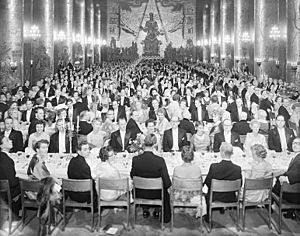
- Julebord – This is a traditional Scandinavian feast or banquet held in December (and sometimes November) before Christmas. People eat traditional Christmas foods and drink beverages, often from a buffet. Julebords are known for having lots of food and drink, both old and new dishes. They are often lively parties and an important social gathering for friends and coworkers.
- Nobel Banquet – This is an annual formal dinner held on December 10 in Stockholm City Hall in Sweden. It takes place after the Nobel Prize ceremony. Guests wear formal clothes, enjoy a multi-course dinner, and watch entertainment.
Breakfasts
- North Melbourne Grand Final Breakfast – This is a breakfast event organized by the North Melbourne Football Club on the morning of the AFL Grand Final (a big Australian rules football championship game).
- NRL Grand Final Breakfast – Similar to the AFL event, this is a breakfast organized by the National Rugby League (a rugby league championship) during the week of their Grand Final.
- Pancake breakfast – This is a public meal often held at summer festivals and community events in the United States and Canada. Volunteers cook many pancakes and other hot breakfast foods for everyone to enjoy.
Dinners
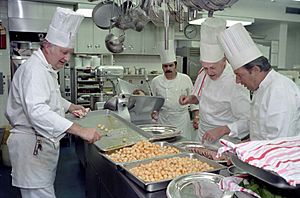
- Bracebridge Dinner – This is a fancy, seven-course dinner held at the Ahwahnee Hotel. It's presented as a feast from the Renaissance era, inspired by a story about a Yule (Christmas) celebration. It started in 1927.
- Christmas dinner – This is a meal traditionally eaten around Christmas, which can happen from Christmas Eve to Christmas Day.
- Kūčios – This is the traditional Christmas Eve dinner in Lithuania, held on December 24.
- Passover Seder – This is a special dinner during the Jewish celebration of Passover. Families and friends gather, and the host reads from the Haggadah, which tells the story of Jewish people being freed from slavery in Egypt by God through Moses. This story is a very important part of Jewish identity.
- Progressive dinner – Also called a safari supper in the U.K., this is a dinner party where each course is prepared and eaten at a different host's house. So, you might have appetizers at one house, the main course at another, and dessert at a third.
- Reunion dinner – This meal is held on New Year's Eve of the Chinese Lunar New Year. Family members come together to celebrate, and it's often considered the most important family meal of the whole year.
- Réveillon – This is a long dinner held on the evenings before Christmas Day and New Year's Day in various parts of the world.
- State dinner – This is a formal dinner or banquet paid for by a government and hosted by a head of state (like a president or king) at their official home. It's held to strengthen friendly relationships between the host country and a visiting foreign leader.
- Thanksgiving dinner – This is the main part of Thanksgiving celebrations in the United States and Canada. It's a large meal, usually with a roasted turkey. Most of the traditional American dishes come from foods native to the Americas, as the first European settlers learned about these foods from Native Americans.
- Three Emperors Dinner – This was an incredibly fancy banquet held in Paris, France, in 1867. It was prepared by a famous chef and had 16 courses with eight expensive fine wines, lasting for eight hours! It was attended by King William I of Prussia, Tsar Alexander II of Russia, his son, and Prince Otto von Bismarck.
- Thursday Dinners – These were meetings of artists, thinkers, politicians, and leaders hosted by the King of Poland, Stanisław II August, during a period known as the Enlightenment in Poland.
- Wild onion dinner – These are social gatherings held in the spring by various Native American tribes in Oklahoma. The meals focus on wild onions, which were a common food for many tribes east of the Mississippi River.
The White House
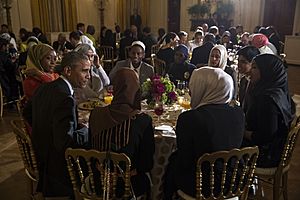
- White House Correspondents' Dinner – This dinner first happened in 1921 and is now a tradition in Washington, D.C.. The president and vice president usually attend. It's traditionally held on the last Saturday in April.
- White House Iftar dinner – This is an annual reception held at the White House, hosted by the U.S. President and the First Lady. It celebrates the Muslim month of Ramadan.
Feasts
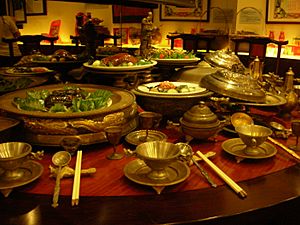
- Bean-feast – This was mainly an annual dinner given by an employer to their employees. It can also mean any fun occasion with a meal and an outing.
- Boar's Head Feast – This is a festival celebrated during the Christmas season.
- Feast of the Seven Fishes – This is an Italian-American way to celebrate Christmas Eve with meals made of fish and other seafood.
- Karamu – This is a feast that takes place on December 31, which is the sixth day of the Kwanzaa celebration.
- Manchu Han Imperial Feast – This was one of the grandest meals ever recorded in Chinese history. It had at least 108 unique dishes from both Manchu and Han Chinese cultures during the Qing dynasty. It was only for the Emperors and lasted for three whole days, with six banquets!
- Mesoamerican feasts – In ancient Mesoamerica, feasts were important for social and political discussions. Rich or royal families hosted feasts to gain loyalty and a good reputation, which helped them politically or socially. People of all social levels also hosted feasts to celebrate family and life.
- Supra – This is a traditional Georgian feast and a very important part of Georgian social life. There are two types: a festive keipi and a more serious kelekhi, which is always held after burials.
Suppers
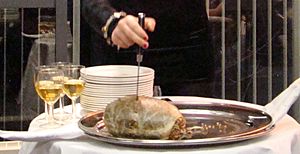
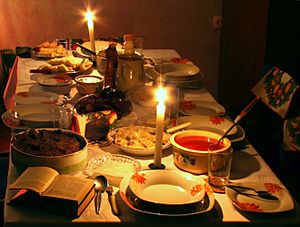
- Burns supper – This is a celebration of the life and poems of the Scottish poet Robert Burns. These suppers are usually held on or around his birthday, January 25, but can happen at other times too.
- Pie supper – This is a social gathering where pies are auctioned off to raise money, often for a local school or fire department.
- Wigilia – This is the traditional Christmas Eve vigil supper in Poland, held on December 24.
Images for kids
-
Depictions of the Last Supper have been undertaken by artistic masters for centuries; Leonardo da Vinci's late 1490s mural painting in Milan, Italy, being the best-known example.
-
A 1601 painting of the Supper at Emmaus, by Caravaggio
-
An anonymous sixteenth-century painting showing participants of the Feast of the Pheasant
-
Jimmy Carter toasts Carlos Andres Perez, the President of Venezuela, during a state dinner.
-
Foods at a Thanksgiving dinner
-
The chamber where the dignitaries would dine and meet with King Stanisław August Poniatowski at Thursday Dinners
See also
- Banqueting house
- Campagne des banquets
- Champagne breakfast
- Dining room
- Dinner dress
- Eating club
- Food festival
- Food history
- Last Supper in Christian art
- Pampa mesa
- Potluck
- Supper club
- Tabagie (feast)
 | May Edward Chinn |
 | Rebecca Cole |
 | Alexa Canady |
 | Dorothy Lavinia Brown |


